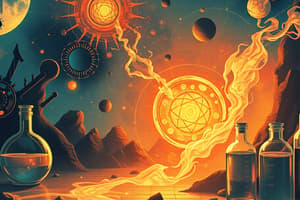Podcast
Questions and Answers
Which step is NOT part of the scientific method?
Which step is NOT part of the scientific method?
- Formulation of a question
- Analysis of data from experiments
- Final conclusion without testing (correct)
- Observation of a phenomenon
Scientific theories are based on a limited amount of evidence.
Scientific theories are based on a limited amount of evidence.
False (B)
What are the three broad branches of science?
What are the three broad branches of science?
Physical Sciences, Life Sciences, Earth Sciences
In the scientific method, a hypothesis must be _____ to be considered scientific.
In the scientific method, a hypothesis must be _____ to be considered scientific.
Match the following scientific branches with their focus areas:
Match the following scientific branches with their focus areas:
Which scientific principle emphasizes the need for experiments to be reproducible?
Which scientific principle emphasizes the need for experiments to be reproducible?
Empirical evidence refers to information that is based on observation and measurable facts.
Empirical evidence refers to information that is based on observation and measurable facts.
What is the importance of objectivity in scientific research?
What is the importance of objectivity in scientific research?
What is the primary purpose of using standardized units of measurement in scientific research?
What is the primary purpose of using standardized units of measurement in scientific research?
Proper use and understanding of scientific instruments is unnecessary for accurate data collection.
Proper use and understanding of scientific instruments is unnecessary for accurate data collection.
What is the process by which scientists review each other's research findings before publication?
What is the process by which scientists review each other's research findings before publication?
Uncertainty in measurements must be quantified and _________ to enhance the understanding of data reliability.
Uncertainty in measurements must be quantified and _________ to enhance the understanding of data reliability.
Match the following scientific communication methods with their descriptions:
Match the following scientific communication methods with their descriptions:
Flashcards
What is the Scientific Method?
What is the Scientific Method?
A systematic approach to understand the natural world, involving observation, experimentation, and reasoning.
What is a scientific theory?
What is a scientific theory?
A well-substantiated explanation of aspects of the natural world, backed by a large body of evidence.
What are Physical Sciences?
What are Physical Sciences?
The study of non-living matter and its properties.
What are Life Sciences?
What are Life Sciences?
Signup and view all the flashcards
What are Earth Sciences?
What are Earth Sciences?
Signup and view all the flashcards
What is Objectivity in science?
What is Objectivity in science?
Signup and view all the flashcards
What is Replicability in science?
What is Replicability in science?
Signup and view all the flashcards
What is Falsifiability in science?
What is Falsifiability in science?
Signup and view all the flashcards
SI Units (International System of Units)
SI Units (International System of Units)
Signup and view all the flashcards
Measurement Uncertainty
Measurement Uncertainty
Signup and view all the flashcards
Scientific Research
Scientific Research
Signup and view all the flashcards
Peer-Reviewed Publications
Peer-Reviewed Publications
Signup and view all the flashcards
Scientific Communication
Scientific Communication
Signup and view all the flashcards
Study Notes
The Scientific Method
- Science is a systematic approach to understanding the natural world.
- It relies on observation, experimentation, and reasoning.
- The scientific method is a framework for conducting scientific research, and it typically involves several key steps.
- These steps often include:
- Observation of a phenomenon
- Formulation of a question or hypothesis to explain the observation.
- Design and conduct of experiments to test the hypothesis.
- Collection and analysis of data from the experiments.
- Interpretation of the data and drawing conclusions.
- The scientific method is iterative, meaning that conclusions may lead to new questions and further experiments.
- Scientific theories are well-substantiated explanations of aspects of the natural world that are supported by a vast body of evidence.
Branches of Science
- Science encompasses various disciplines, frequently categorized into broad branches:
- Physical Sciences: These examine non-living matter and its properties.
- Physics: Focuses on the fundamental laws governing matter and energy (e.g., motion, forces, energy).
- Chemistry: Examines the composition, structure, properties, and reactions of matter.
- Astronomy: Studies celestial objects and phenomena.
- Life Sciences: These investigate living organisms and their interactions.
- Biology: Explores the structure, function, growth, origin, evolution, and distribution of life.
- Zoology: Focuses specifically on animals.
- Botany: Focuses specifically on plants.
- Ecology: Examines interactions between organisms and their environment.
- Earth Sciences: These examine the Earth and its dynamic processes.
- Geology: Studies the solid Earth, including rocks, minerals, and landforms.
- Meteorology: Focuses on weather patterns and atmospheric processes.
- Oceanography: Studies the ocean and its properties.
- Physical Sciences: These examine non-living matter and its properties.
Scientific Principles
- Objectivity: Scientists strive to minimize bias and personal opinions in their observations and analyses.
- Replicability: Experiments should be designed so that others can reproduce the results.
- Falsifiability: A scientific hypothesis must be testable and potentially disproven by evidence.
- Empirical Evidence: Scientific claims are supported by observable and measurable evidence.
- Skepticism: A healthy dose of skepticism is essential in evaluating claims and data.
Scientific Measurement
- Accurate and precise measurements are fundamental to scientific progress.
- Standardized units of measurement, such as the International System of Units (SI), are used across the scientific community to promote clarity and comparability across experiments.
- Proper use and understanding of instruments is crucial in ensuring the reliability and accuracy of data collected during scientific studies.
- Uncertainty associated with measurements (e.g., due to instrument limitations or human error) needs to be quantified and reported.
Scientific Communication
- Scientists communicate their findings through various methods, most notably peer-reviewed publications.
- These publications detail the methodology, results, and interpretations of studies, making them available to other scientists for review and scrutiny.
- This process of peer review helps to ensure the quality and validity of scientific research.
- Scientific conferences and presentations also serve as important channels for sharing and discussing current research.
- Public engagement and outreach are increasingly important to promote scientific literacy and understanding.
Studying That Suits You
Use AI to generate personalized quizzes and flashcards to suit your learning preferences.




